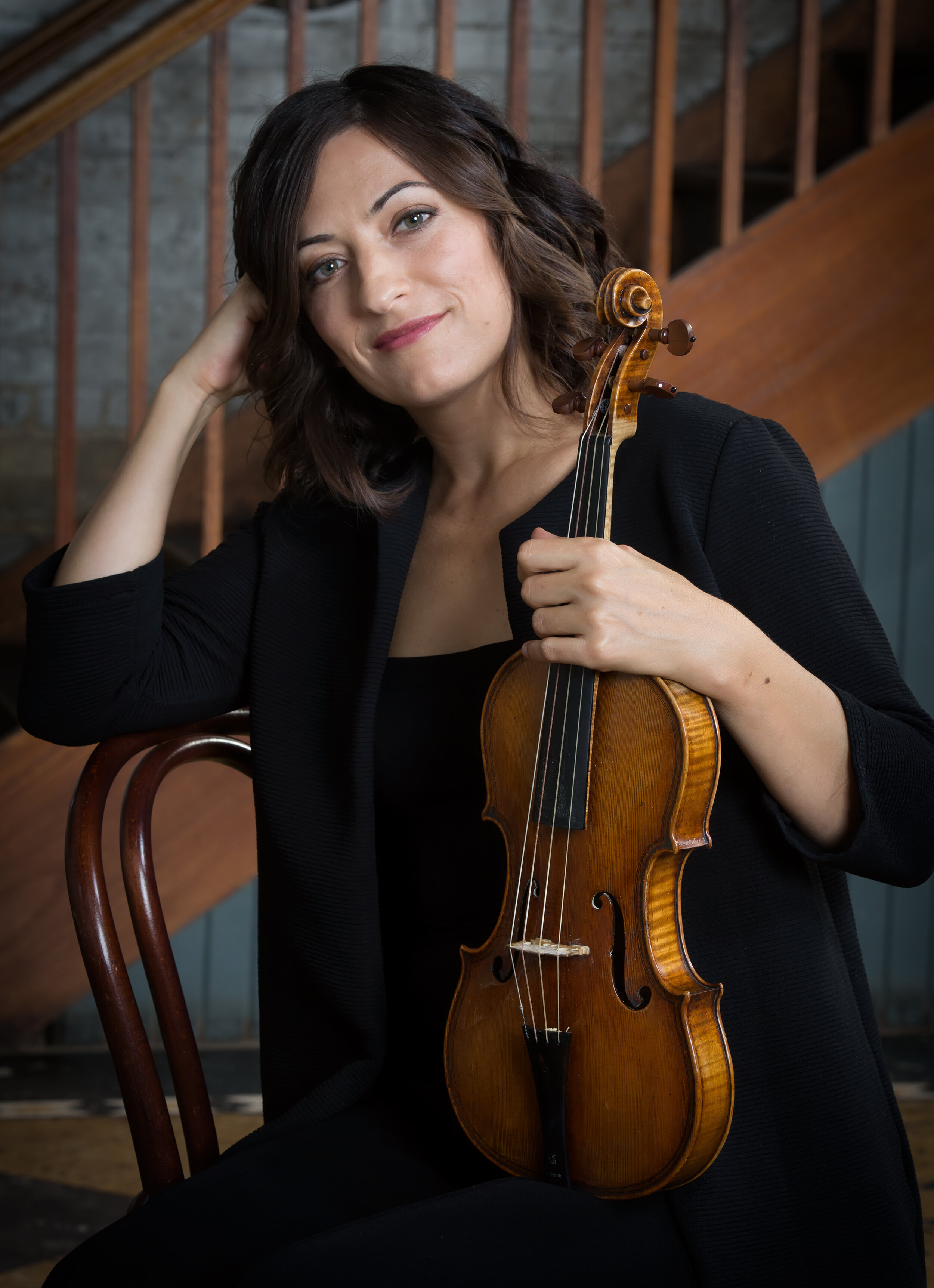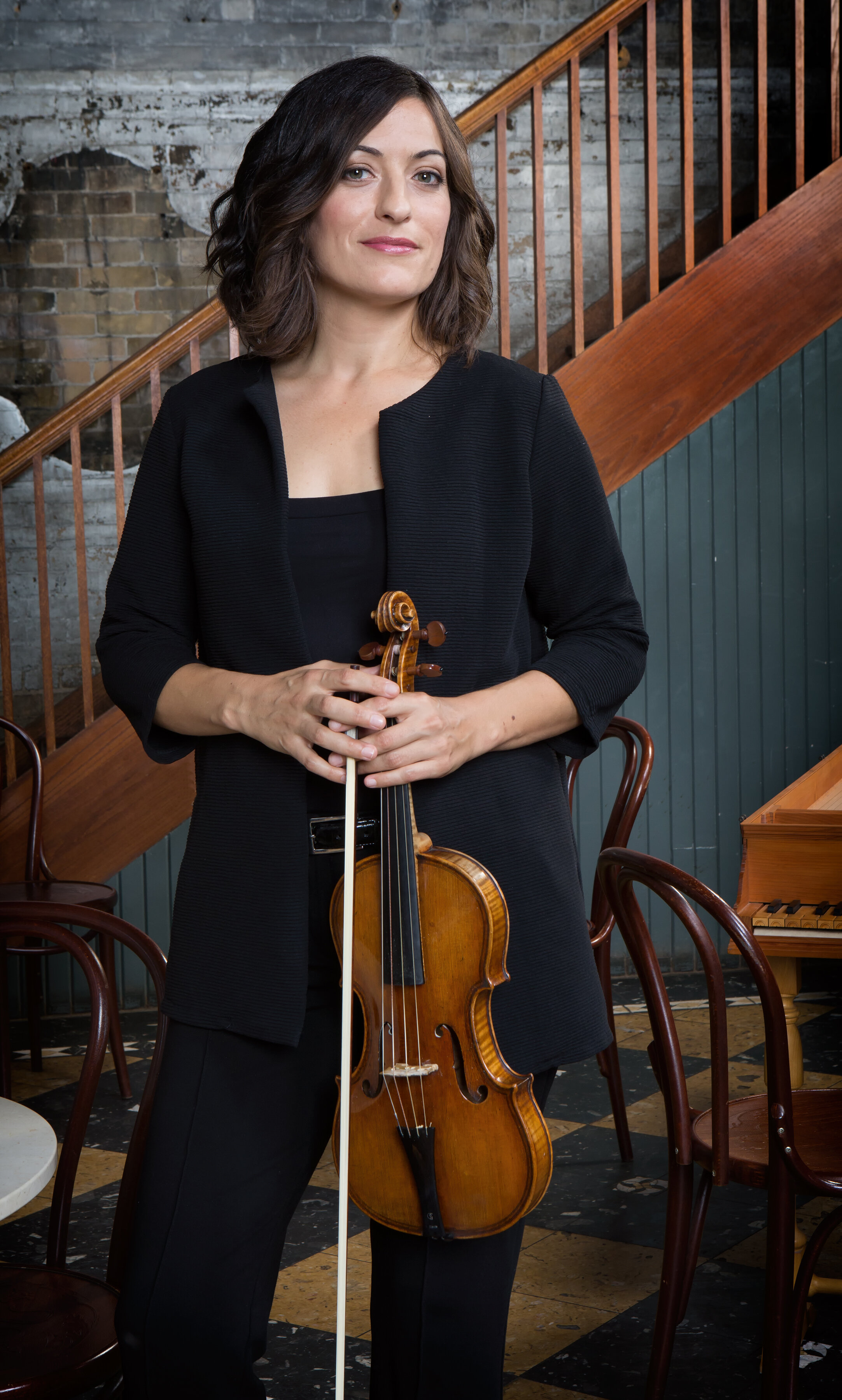Elisa Citterio, Music Director, violin
Credit: Cylla von Tiedemann
Ahead of Tafelmusik’s premiere of ‘Baroque Roots’——a program that surveys the early periods of baroque music in Vienna as influenced by Italian composers of the 1600’s——Tafelmusik’s Music Director and violinist, Elisa Citterio, answered a few questions for Blue Riband about the creative processes that came together to form an eclectic program that features ten compositions from nine composer:
Farina - Sonata detta la Farina, for violin & continuo (1628)
Bertali Ciacona, for violin & continuo (c.1650)
Buonamente Sonata prima a 3 (1636)
Bertali Sonata a 5 in g (c.1650)
Biber Balletti lamentabili a 4 (1670)
Neri Sonata a 9, op. 2, no. 11 (1651)
Guido Morini Italian Soundscapes (2019) – World premiere
Fux Orchestral suite in G Minor (1701)
Muffat Chaconne "Propitia sydera" (Propitious stars; 1701)
Vivaldi Concerto in D Major, RV563
Though times change, people still need to feel emotions, to be inspired, surprised or comforted, and music is always the first choice for these important moments. The language changes but I imagine a sort of infinite tower whose base is in the past but that we are constantly are building. ““ elisa citterio
(interview with elisa citterio)
one of the things that i find the most interesting in the format of orchestral concerts is the process that goes into putting together a program. how do Tafelmusik programs generally come together? and with the 'Baroque Roots’ program in particular, what were some of the parameters that resulted in the selection?
(EC) There are many different ways to create a program. Sometimes we have a theme and we choose pieces that are tied to it. At other times, we have a specific instrumentation available which may impose some restrictions. And there are times when we are totally free to work with our creativity.
I’ll give you a couple of examples: Our concert titled “Baroque Roots” was conceived around the idea of a particular city, Vienna. I selected music by composers who were born or who lived there, and who contributed to the musical flourishing of the 17th century. We paid special attention to the Italian influences on the Viennese court. Another future program titled “Passions of the Souls “ is based on what a piece of music might mean to the listener. Some works bear a title that is connected to a specific emotion or passion. Others are so strongly evocative that even without a title it is quite clear what the intended effect is. With other programs we want to explore a musical genre. Through our own musicological and historical research, we look for the most significant pieces written around that genre.
since moving all the way from italy to take this position two years ago, how’s your experience of the city been so far?
(EC) Italy and Canada are geographically far apart and quite different, but both countries have great aspects. Canada has been and is a safe haven for thousands of people from around the world, and I greatly appreciate how this country is able to help people who come from difficult situations at “home.” I am quite amazed by the many initiatives that newcomers have access to and through which they are able to participate in Canadian life. I love how people in Canada can express themselves without restrictions and be appreciated for who and what they are. Italy has a lot to learn from this example.
Elisa Citterio, Music Director. Photo Credit: Daniel Banko, Banko Media
in relation to your experiences in italy and beyond, what direction do you feel toronto is heading in Classical and Baroque music? and how does Tafelmusik help to shape that?
(EC) Europe has the advantage of having been at the centre of renaissance and baroque arts and music as they developed. People there are constantly exposed to that art, and accessing historical sources is easy. Canada has done a lot to import music, musicians and knowledge and is now considered a very rich country in terms of its baroque and classical music scene. But what is really impressive about Toronto is that you can find almost any instrument here. We are looking for a very exotic instrument for a new multimedia show coming up and found it here in the city!
As one of the world’s leading period ensembles, Tafelmusik is uniquely positioned to explore music from both earlier and later periods through the lens of our own expert understanding of the music of the baroque. After all, at the heart of baroque music is inspiration: composers who wrote music that reflected the times they lived in, and who were influenced by their contemporaries and by even earlier works. We do our best to perform this repertoire as it would have been heard when it was first written. But we also infuse this music with inspiration from our experience in the world today.
with the international acclaim of companies like Opera Atelier, Tafelmusik and Early Music Vancouver, what are some of the factors that you think contributes to this growth of interest in the genre in Canada?
Elisa Citterio, Music Director. Photo Credit: Cylla von Tiedemann
(EC) Speaking for Tafelmusik, I can say that our continued activities in the area of touring, recording, and artist training over the past forty years (in addition to our regular concerts here in Toronto) have contributed to the growth of interest in period performance in Canada. Tafelmusik’s vision is to be an international centre of excellence in period performance, and it’s part of our mission to engage audiences locally, provincially, nationally and internationally with historically informed musical experiences (live and recorded) on period instruments. Tafelmusik regularly tours in Canada, USA, Asia-Pacific and Europe, and we’ve developed a national and international reputation with classical music listeners and presenters. Our unique multidisciplinary programs - such as ‘Safe Haven’, ‘Tales of Two Cities: The Leipzig-Damascus Coffeehouse,' ‘The Galileo Project' and 'House of Dreams' and the latest one, ‘The Indigo Project’ (coming up in 2020), have opened doors to opportunities across Canada and around the world.
Tafelmusik's big investment in artist training is another reason why the interest in period music continues to grow. Our intensive annual artist training programs Tafelmusik Baroque Summer and Winter Institutes (TBSI and TWI) attract 100 emerging professional musicians from more than 15 different countries each year. The training program includes orchestra and choir rehearsals, masterclasses, opera scene study for singers, chamber ensembles, private lessons, lectures and workshops, classes in baroque dance, in addition to concerts by participants and faculty.
improvisation is one of the features of the concert experience that orchestral music is often accused of lacking in comparison to other genres and musical traditions; but is seems you actively encourage improvisation in programs——you’ve inserted space for improvisation between some of the compositions in this program——how do you do navigate between the priorities of compliance with the score and improvisation for the sake of the concert experience?
(EC) Improvisation is the base for each performance, whatever the period or piece of music. For me improvisation includes the dynamics, the use of tempo or even gestures on stage. Early baroque works in particular require more improvisation from the musicians, who have a lot of responsibility for every aspect of music making, even adding notes or music to the score in certain situations. In the upcoming Baroque Roots program we’ll have a few spots where I’ve asked a few musicians to connect pieces in the first half of the program through imporvisation. It’s a characteristic of early performances that helps encourage the flow of energy during the concert.
Tafelmusik Baroque Orchestra. Photo Credit: Cylla von Tiedemann
with Tafelmusik’s theme this season ‘Old Meets New’, what essence in Baroque music do you think translates best in modern compositions? and how did this inspire the choice to premiere morini’s ‘Italian Soundscapes’?
(EC) One of the most difficult tests for a composer is to write a fugue in the style of Bach. What I have loved in my experience of studying historical performance style is that I finally began to understand where the sound comes from, how it developed, what kind of audience was there to listen to early or classical or romantic music, and what the composers wanted to offer their listeners. Though times change, people still need to feel emotions, to be inspired, surprised or comforted, and music is always the first choice for these important moments. The language changes but I imagine a sort of infinite tower whose base is in the past but that we are constantly are building.
For this program I wanted a work by Guido Morini to complement the theme of the strong Italian influence on the Viennese court. Guido can write any kind of baroque-inspired work and there is such a great “Italianitá” in all of his music. His evocative music is a wonderful example of how with only seven notes, the possibilities of creating music in any genre are endless.
many thanks to director citterio for her time in participating in this interview! ‘Baroque Rooks’ runs from Wed Oct 16 to Sun Oct 20 at Jeanne Lamon Hall, Trinity-St. Paul's Centre.



